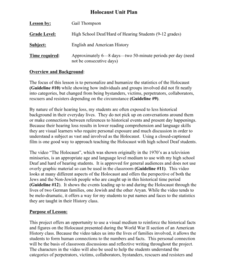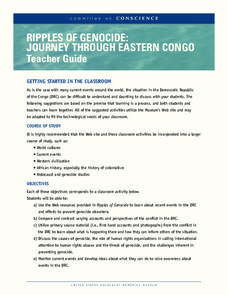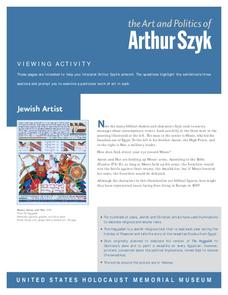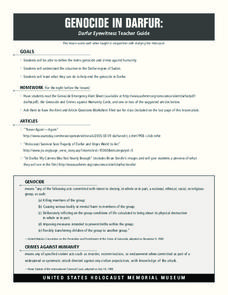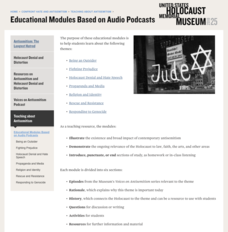Facing History and Ourselves
Taking a Stand: Models of Civic Participation
How does an individual take a stand for a principle or belief? what skills are required to do so? What are the challenges and risks in doing so? Class members study examples of individuals engaging in such activities and then identify...
Western Illinois University
Holocaust Unit Plan
Would it have been you? Scholars investigate the horrors of the Holocaust during World War II. They view, interpret, and analyze the video The Holocaust to gain insight into who exactly was impacted by the events Europe. They then...
US Holocaust Museum
Ripples of Genocide: Journey through Eastern Congo
Could you locate the Democratic Republic of Congo on a map? Scholars investigate the genocide taking place in Eastern Congo. Groups explore web-based evidence as well as the Ripples in Genocide source to take a closer look at the issue....
US Holocaust Museum
The Art and Politics of Arthur Szyk
Have you ever listened to a song that had a deeper political meaning to it? Every examined a work of art with layers of meaning? Pupils analyze the drawings of Arthur Szyk. They research the deeper meaning of several artistic cartoons...
US Holocaust Museum
Genocide in Darfur: Darfur Eyewitness Teacher Guide
The events of the Holocaust in World War II would never happen again, right? Scholars research the current genocide taking place in Darfur. Using video and Holocaust Reading Passages, they analyze the horror of this forgotten part of the...
US Holocaust Museum
Remember the Children: Daniel’s Story
Imagine being a child forced from your home and into a concentration camp during World War II. Scholars prepare for a visit to the United States Holocaust Museum by researching the children of the horrible event. They analyze...
US Holocaust Museum
Educational Modules Based on Audio Podcasts
Imagine hearing someone claim an event like the Holocaust never happened. Pupils use audio podcasts and reading passages to dive into the lives of those impacted by the Holocaust of World War II. Using the information they gather, class...
Facing History and Ourselves
Identity and Place
Build scholars' ability to understand their own values and learn about World War II at the same time. Scholars write poetry and discuss identity and place in depth with an in-depth social studies resource.
Facing History and Ourselves
Laws and the National Community
When it comes to the law, is justice always served? Teach scholars about how law sometimes enables prejudice of entire groups of people with a unit on World War II that includes a warm-up activity, analysis of primary sources,...
Facing History and Ourselves
Justice After the Holocaust
Though there could be no true justice for the horrors of the Holocaust, many of those responsible for crimes against humanity were found guilty in the eyes of the law. Using primary and secondary sources in the 16th installment of a...
Facing History and Ourselves
The Holocaust: Bystanders and Upstanders
Scholars analyze the role of bystanders during the Holocaust. The investigation explores the roles of the bystanders, upstanders, and rescuers with primary and secondary resources to determine actions taken—or not—and their implications...
Facing History and Ourselves
How Should We Remember?
We must remember the past in order to avoid its mistakes. Young historians analyze the importance of historical remembrance using primary and secondary documents, as well as video clips. They then study the creation of a World War...
Facing History and Ourselves
Kristallnacht: Decision-Making in Times of Injustice
Have you ever been singled out in a crowd before? Pupils investigate and analyze the events of the Holocaust. They dive into the life of a middle school student, as well as the diary entries of those in Kristallnacht during World War...
Museum of Tolerance
Documents That Shape Society
The Bill of Rights is a foundational document of American democracy, much like the Nuremberg Laws were a foundational document of the Reichstag of Nazi Germany. But that's where their similarities end. Engage high schoolers in a...
While They Watched
Teaching the Holocaust
What is the difference between prejudice and discrimination? Between collaborators and bystanders? Guilt and responsibility? Prompt learners to think critically about a very complex and textured topic with an innovative packet...
Facing History and Ourselves
Decision-Making: Introduction to the Unit
Make your classroom a supportive and communicative place to be before beginning a unit on the Holocaust. Working together as a class, learners reflect on their previous experiences of classroom discussions before establishing a...
California Education Partners
Hope Despair Memory
Elie Wiesel's "Hope, Despair and Memory" provides ninth graders an opportunity to demonstrate their ability to analyze complex text. Individuals craft an essay that draws evidence from the text of the speech to show how Wiesel develops...
Community Colleges of Los Angeles
Seeking Refuge: Understanding Refugees in Canada
What if you had no choice but to leave everything behind and seek asylum elsewhere? Do countries have an obligation to accept refugees? To gain an understanding of the complexity of the issues of refugee rights, class members first...
Museum of Tolerance
Creating an Ideal World
To conclude a study of social justice and tolerance designed to prepare classes for a visit to the Museum of Tolerance, class members brainstorm a safe and peaceful world. They then write about their own vision of this world.
Museum of Tolerance
My Experience with Injustice
As part of their preparation for a visit to the Museum of Tolerance, individuals are asked to write about a time when they witnessed or experienced unjust, biased, or prejudicial treatment. A great way for writers to make a personal...
Museum of Tolerance
Essential Vocabulary and Concepts
Genocide. Scapegoat. Propaganda. Words are powerful. Words carry the weight of history. To prepare for a visit to The Museum of Tolerance, class members consider the weight of meaning in words related to intolerance.
Museum of Tolerance
What Do I Know Already? What Can I Predict?
In preparation to a visit to the Museum of Tolerance, class members engage in a prediction activity by creating a folder to house materials they feel represent ideas, topics, or issues they may encounter during their visit.
Museum of Tolerance
The Price of Personal Responsibility
A reading of Patrick Henry's "Speech in the Virginia Convention," Henry David Thoreau's "Civil Disobedience," and Rev. Martin Luther King, Jr.'s "Letter from Birmingham Jail" launch a discussion about the price one is willing to pay to...
Core Knowledge Foundation
Genetics and the Master Race
How did the beginnings of genetic research influence the Nazi party? A thorough, engaging unit incorporates the work of Gregor Mendel, the study of inherited traits, and the use of racism and discrimination during the Holocaust.



